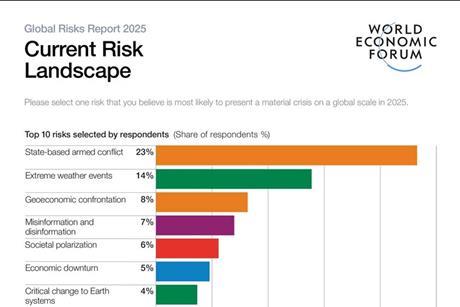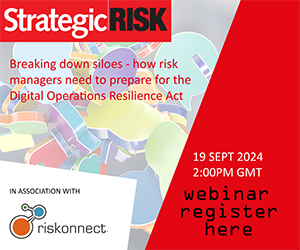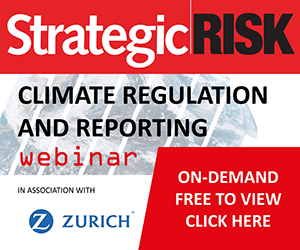Asia Pacific
Cyber risk: It’s everyone’s fight
Cyber criminals are growing stronger as our reliance on technology makes our defences weaker. And it’s a problem too big for the IT department alone. So how can risk managers build resilience as cyber threats evolve?
WEF global risk report: Businesses face escalating environmental, geopolitical, social, and technology challenges
War risk is the biggest immediate fear, endangering stability and progress, while technology and the environment loom large and dominate medium- to long-term concerns, according to the 20th edition of the World Economic Forum’s (WEF) Global Risks Report 2025.
Regulation Watch: Key implications from China’s new Network Data Security Management regulations
Linklaters’ Albert Yuen Linklaters’ Albert Yuen considers the key implications of China’s new Network Data Security Management Regulations and why it is important for risk and compliance managers to understand this new regulation to comply with its data and cybersecurity obligations when operating its China business.
Special report: People risk
Poor people management can have a profound effect on a business – hitting productivity, innovation and morale. More attention must be given to the roots of people risk if we don’t want the talent to run dry.
Cyber crime: Global problem, Vietnamese crisis
In Vietnam, online business is thriving, but tech infrastructure is not yet fit to meet the challenge, leaving the country in an escalating battle against cyber crime. But with Chinese hackers often blamed for cyberattacks, its issues are indicative of wider tensions across the APAC region.
Spotlight on: using AI to manage supply chain risks
Generative AI promises to transform supply chains – enhancing efficiency and data quality, reducing labour costs, and much more. But over-reliance on this new tech could expose the entire chain to new weaknesses in accuracy, security and fairness.
How risk managers can tackle growing sanctions risks
The complexity and magnitude of international sanctions now demands vigilance on a new scale. Smaller businesses may not have the ready resources to tackle the issue, but the laws won’t make exceptions. So what practical steps can you take to stay safe?
Lessons from the Indian Ocean tsunami - 20 years on
A new report by the Swiss Re Institute outlines the key lessons risk managers and governments must learn from the world’s most deadly tsunami
SR Q4 2024: A resolution for change
Closing out another rollercoaster year, it’s easy to feel overwhelmed and not exactly brimming with cheer. But risk managers are tougher than that. We continue to prove that this industry is the place for resilience, innovation and e ecting real change. Bring on 2025
Are you ready for round two? What we know about Trump’s second term so far
As Donald Trump prepares to re-enter the White House, risk managers are trying to predict what upheaval awaits. Expect regulatory rollbacks, a return to his controversial approach to international relations, and an ‘America First’ economic approach that may put global trade in a tailspin.
Why did South Korea declare martial law? What risk managers need to know
Chaos and uncertainty ensued after South Korea’s President unexpectedly declared martial law on Tuesday. Our Asia correspondant on the ground, Trevor Treharne, reports
Case study: How Ukrainian furniture makers are staying resilient and relevant despite the challenges of war
The ongoing conflict in Ukraine has had far-reaching consequences across all sectors, but the furniture industry has proven to be one of the most resilient. Here’s how the key players are adapting to become core suppliers across Europe
Climate report 2024: Risk managers attitudes to climate threats revealed
When it comes to embedding climate threats into organisational risk management strategies, progress is being made. Slowly. But, as our 2024 climate change survey finds, the fight for resources continues.
How EV fires sparked fears, supply chain tensions, and a reputational blaze
Electric vehicle battery fires in South Korea raised public fears and sparked geopolitical tensions over supply chain risks. Here’s what risk managers can learn
The cool head: Deutsche Bank’s Ramesh Gopal on his risk management journey and how to keep a cool head
Deutsche Bank’s Ramesh Gopal doesn’t let volatility get to him, even when managing a risk region that includes Russia, Ukraine and Israel. Here he discusses his ‘keep calm and carry on’ mentality, and why Dubai is the perfect centre point for global business.
Case study: How G4S successfully switched international programmes provider in the quest for better service
For a company like G4S, a world-leading integrated security business operating in more than 90 countries, implementing a global programme that meets all your needs is no easy task. It’s a good thing changing provider to RSA proved to be a journey worth making.
Spotlight on: greenwashing risks and how to avoid them
There is huge pressure for companies to present an environmentally friendly image but consumers, regulators and law courts are now quick to silence greenwashing. So, if you plan to shout about your green credentials, make sure you have the data to back up your claims.
Special report: Climate change 2024
The race to tackle climate-related risks is on, and many businesses know what they need to do. But how can they overcome barriers and get the support needed to really make a difference?
SR Q3 2024: The best laid plans…
As risk managers, we spend lots of time preparing for the worst. And yet, preparation can’t protect you from everything. When disaster strikes, sometimes the best you can do is keep smiling – even if it is through gritted teeth – and carry on, logging lessons for next time.
How to use geostrategic intelligence to protect your business from geopolitical instability
Growing political risks are forcing risk owners and managers to rethink their approach to geostrategic intelligence, writes Henry Wilkinson, chief intelligence officer at Dragonfly




























